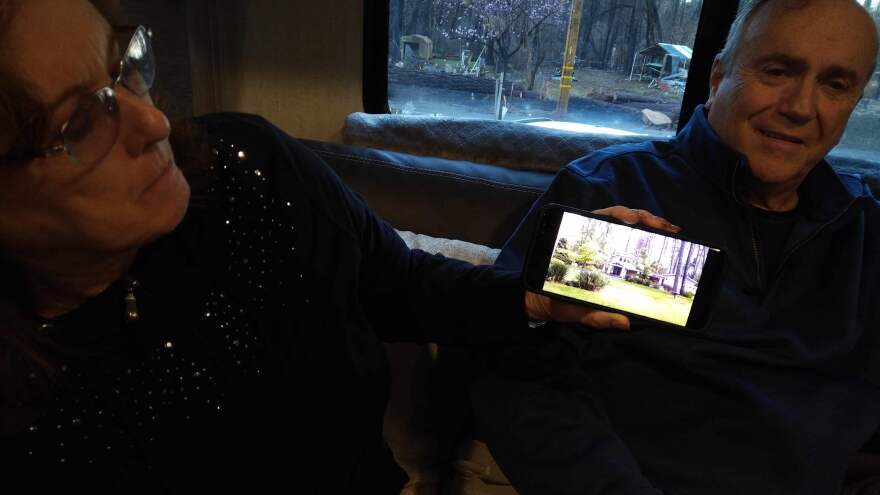In the northern California foothills, the town of Paradise was almost completely destroyed by last fall's Camp Fire. But sprinkled across the ruins, there are now a few signs of life as homeowners and contractors begin the rebuilding process.
Jim and Colleen Corner's place looks like a post-apocalyptic homestead. The neighborhood's been depopulated. Block after block of ruins. Torched vehicles. Hulking pines, many dead, have yet to topple.
At the apex of a semi-circular driveway, translucent, linebacker-sized plastic tanks, hold precious drinking water. The Corner's two-story home since 1975 exists now only in memories and photographs.
According to Jim Corner, after the fire, any second thoughts about coming back and rebuilding passed quickly. "I doubted, you know, right after it happened. And I asked Colleen 'what do you want to do?' and she said 'no, no doubt,' she didn't even hesitate, she wants to come back, and I said, OK, that's it."
Then, he said, they moved quickly. "Within two and a half weeks, we had plans at the architect, and that's why we're kind of first. Because it was like, we we're just pushing to go."
Colleen interjected, "When we could first come back up the hill, he was already started on plans. I called PG&E and asked for a temporary power pole, they said 'well, we're going to take applications,' I said, "OK, I'm applying!"
Now they have a power pole, the trash service and mail service have returned. "[We're just] waiting on the paperboy," Colleen laughed.
Though they make it sound easy, the Corners are at a bit of an advantage. Jim is in a related trade — he's an estimator for an abatement company and knows a thing or two about swinging a hammer. They've remodeled their home four or five times over the decades.
The two nevertheless find mirth in their personal saga. Jim is entering his 70s with two prosthetic knees and explains that they were in escrow on a one story home elsewhere, mainly to ditch the stairs in their two story home, but ended up backing out.

"And then the fire happened, so, we will build a single story," he laughed. "Watch what you ask for, right?"
About three and a half miles away, David Anderson is surrounded by planks of freshly hewn Douglas fir. A property owner and builder with Anderson Brothers Corporation, he and his crew were finishing up framing a home which they got permitted back January.
Like the Corner's, Anderson is a believer. He knows the town will come back. The devastation won't last forever. And the stigma associated with the deadliest wildfire in state history, won't scare off buyers forever, Anderson said.
"I mean for the next year, yes that's going to be an issue, with all the burnt trees and burnt structures and the debris. But I'm looking beyond the first year... I just see this being one of the more modern communities in our state."
As a self-financed small builder, Anderson said his company has been building on the ridge since the early 1980s. He said he expects some changes to the town, with a larger proportion of younger families. He said fiber optic cable is being installed, making the town viable for telecommuters.
Primarily though, he said development restrictions in the valley will drive housing demand in Paradise: "Chico does not have enough physical space to support enough people that work in Chico and so Paradise is needed as a bedroom community. Paradise is all set up, it has the infrastructure, everything is here, just have to rebuild it."

Jim Corner also senses big changes coming to Paradise. He thinks the town will re-emerge, but with fewer people. The funky and cheap dwellings of the past we're lost and building codes preclude their re-creation. "There was a lot of hundred year old shacks," he said. "There was no building department here until 25 years ago. So, there were basically, literally chicken shacks turned into houses. There was mobile homes from 1960, little single-wides sitting around and lots of debris in the yards and I think that type of, this is going to turn into more of a suburbia."
He said the loss of so much older housing — much of it paid off — leaves little doubt that purchase prices and rents will be higher than in the past, possibly beyond the reach of many. "You know, rents here were $800 a month for a two or three bedroom house, right? That's gone. There'll be no more of that, so you're going to have more home owners, less renters---way less," he said.
Aside from themselves and their granddaughter, there are few other signs of life at the Corner's homestead. Nevertheless, the couple is hugely optimistic. Corner said the loss of his forested canopy, will enable the couple to install solar panels and plant fruit trees.
Outside the window of their RV, an ornamental plum that somehow survived has burst into bloom, and it's flowers are all the more cherished. Asked about scheduling the construction, Colleen says they're planning a housewarming party on her birthday, this fall.
Copyright 2019 North State Public Radio


